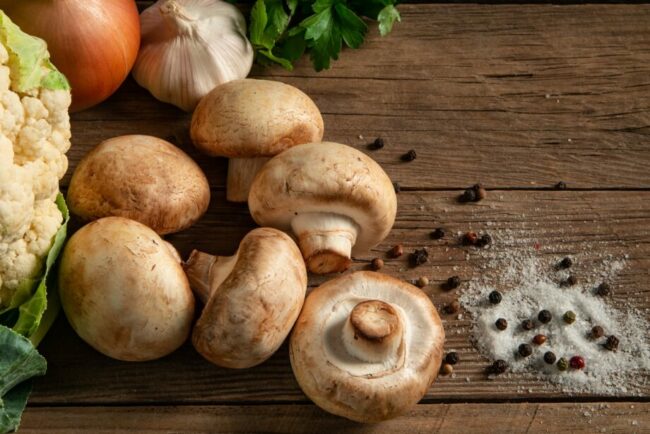If you’ve recently picked up some mushrooms to elevate your cooking, you may have questions about how to store them properly. A versatile ingredient, mushrooms come in an array of forms—fresh, canned, and dried. Yet, understanding their shelf life can be confusing, especially for those who don’t buy them often. In this comprehensive guide, we’re covering everything you need to know about mushroom storage, spoilage, and shelf life.
Table Of Contents
−- The Shelf Life of Various Types of Mushrooms
- Optimal Storage for Fresh Mushrooms in the Fridge
- Storing Mushrooms in the Freezer: Yes or No?
- The Freshness Factor: How It Affects Shelf Life
- Sliced vs. Whole: What Lasts Longer?
- Keeping an Eye on Cooked Mushrooms
- Canned Mushrooms: Beyond the Expiration Date
- Signs Your Mushrooms Have Gone Bad
- Health Risks of Consuming Spoiled Mushrooms
- Effective Ways to Extend the Life of Your Mushrooms
- Conclusion
The Shelf Life of Various Types of Mushrooms
Fresh Mushrooms
Fresh mushrooms typically last between 4 to 7 days in the fridge, although some types may extend up to 10 days. If you find yourself nearing that one-week mark, cooking the mushrooms can buy you a few more days. Once cooked, say in a delightful sauté with green beans, they can be refrigerated for an additional 3 to 5 days.

Canned Mushrooms
Canned mushrooms have a different story altogether. Generally, they carry a best-by date, which is useful but not the end-all-be-all. Due to the canning process, these mushrooms can remain in good condition for several months past their expiration date. However, once opened, aim to use them within 4 to 7 days to ensure maximum quality and safety.
Dried Mushrooms
If you prefer dried mushrooms, you’ll often find a date on the label to guide you. If not, a good rule of thumb is that they’ll remain in top quality for about a year. While dried mushrooms won’t necessarily spoil, their flavor can decline over time.
Optimal Storage for Fresh Mushrooms in the Fridge
Refrigerator storage can be tricky due to moisture, the arch-nemesis of fresh mushrooms. Even though mushrooms thrive on moisture in the wild, a damp environment in your fridge can quickly turn them slimy and unappetizing. The ideal way to keep them fresh and free from slime is by storing them in paper bags. Paper bags offer the perfect environment by absorbing excess moisture while allowing for some air circulation. Store-bought mushrooms with perforated plastic wrap are also effective for short-term storage.
Storing Mushrooms in the Freezer: Yes or No?
Freezing is not the best method for all mushroom types. Due to their high water content, certain varieties like shiitakes can become mushy upon thawing. However, a quick sauté or blanch before freezing can prepare them to be used later in cooked dishes like soups and stews. Stored in an airtight container, these pre-cooked mushrooms can last in the freezer for up to six to eight months without losing much quality.
The Freshness Factor: How It Affects Shelf Life
The longevity of fresh mushrooms is greatly influenced by their initial quality. Always aim for mushrooms that are plump, free from slime, and have intact caps. Moreover, the length of time they’ve been sitting at the store will also affect their lifespan in your refrigerator. Properly stored, fresh mushrooms can maintain optimal freshness for up to a week, while frozen ones can last up to a year.
Sliced vs. Whole: What Lasts Longer?
If you’re considering buying pre-sliced mushrooms, be prepared to use them quickly. Sliced mushrooms spoil much faster than their whole counterparts, usually within 3 to 5 days. If you plan to slice them yourself, do so just before cooking to prevent rapid browning.
Keeping an Eye on Cooked Mushrooms
After you’ve prepared a dish with mushrooms, the clock starts ticking. The broad consensus is that cooked mushrooms should be consumed within 3 to 4 days. To ensure your dish remains safe, also consider the shelf life of other ingredients in the recipe.
Canned Mushrooms: Beyond the Expiration Date
While canned mushrooms come with a best-before date, they won’t spoil immediately after. You can safely store them for several weeks to months beyond this date. However, always inspect the can for signs like bloating or leaks, as they could indicate spoilage.
Signs Your Mushrooms Have Gone Bad
Knowing when to toss your mushrooms can save you from a gastronomic catastrophe. Here are some telltale signs:
- Sliminess: A slimy surface is the most evident sign your mushrooms are past their prime.
- Wrinkles: Aging mushrooms may dry out and develop wrinkles.
- Dark Spots or Patches: These are a clear indicator that spoilage is underway.
- Odor: A strong, unpleasant smell is a definite red flag.
Health Risks of Consuming Spoiled Mushrooms
Eating moldy or rotten mushrooms is a bad idea. While the type of mold may not always be harmful, it’s better to err on the side of caution. Consuming spoiled mushrooms could lead to food poisoning.
Effective Ways to Extend the Life of Your Mushrooms
- Quick Refrigeration: Store your mushrooms in the fridge as soon as you get home from shopping.
- Use Paper Bags: They are more effective than plastic bags in maintaining the texture and preventing moisture buildup.
- Separate Varieties: Different types of mushrooms have varying levels of moisture and spoil at different rates.
Conclusion
In the culinary world, mushrooms are a versatile ingredient, enriching dishes from simple stir-fries to gourmet meals. Understanding their storage requirements and shelf life can be the key to enjoying them at their peak quality. With these expert tips, you’ll become a pro at keeping your mushrooms fresh and tasty.

Editorial Staff
Our writers, editors, content managers, and SEO specialist. We all take part in crafting amazing articles. We spend hours ensuring that each article is based on facts, researched, and thorough. You'll never want to click the back button to look for more answers other than here!
